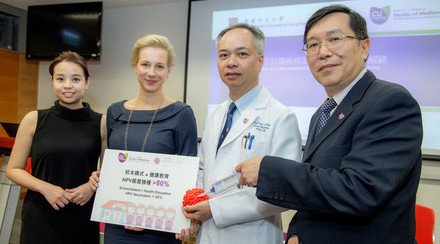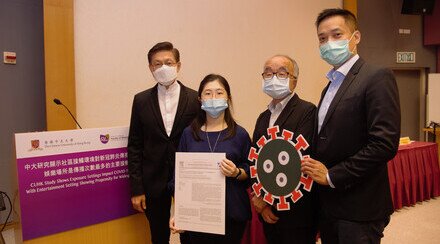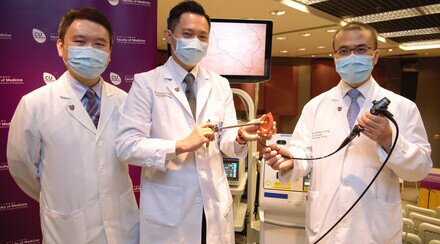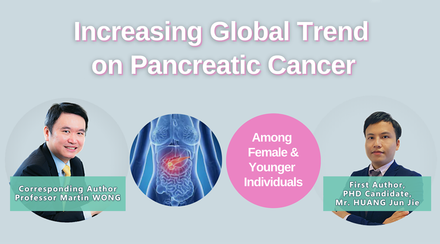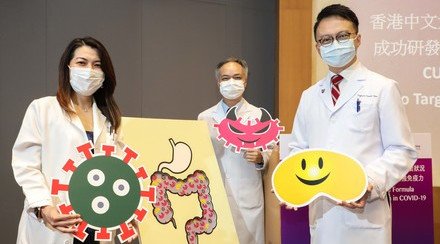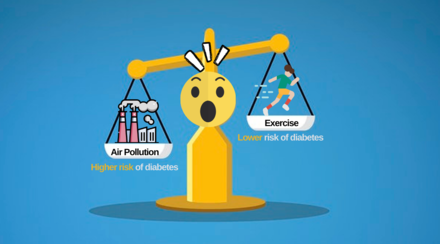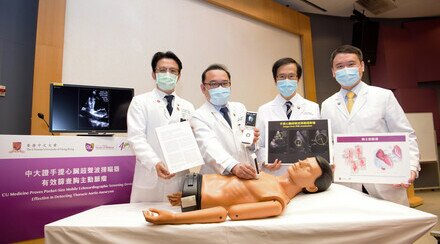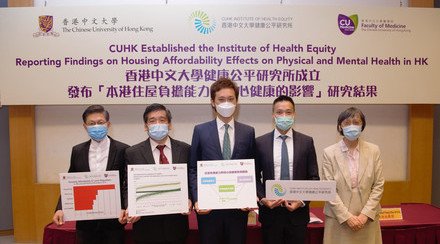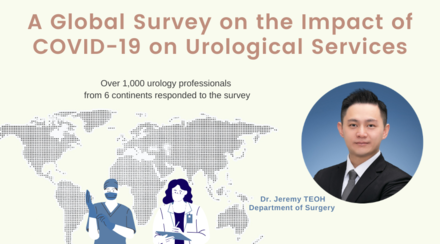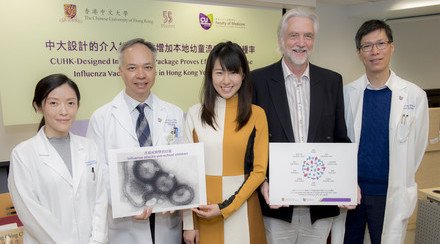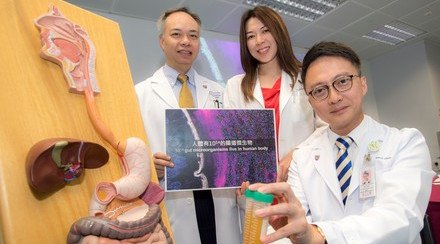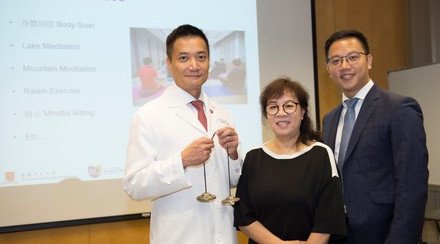CU Medicine Survey Shows Government Recommendation as the Strongest Driver for COVID-19 Vaccine Acceptance
A survey by the Faculty of Medicine of The Chinese University of Hong Kong (CU Medicine) shows a very low level of acceptance for COVID-19 vaccine among the public in Hong Kong. The projected acceptance rates exhibited a “J-shaped” pattern with age- higher acceptance among young adults (18-24 years), then a decrease in the following age group, and finally a linear increase with age. Government recommendation is the strongest driving force for acceptance, whereas perceived severity instead of perceived susceptibility is associated with acceptance of COVID-19 vaccine. The research team hopes this information could help the Government formulate and implement effective vaccination strategies. The findings have just been presented in Vaccine, an international science journal published by Elsevier.

CU Medicine has recently conducted 1,200 phone interviews to identify the drivers and barriers associated with acceptance of COVID-19 vaccine. Results show that government recommendation is the strongest driving force while perceived severity is also strongly associated with the acceptance of COVID-19 vaccine.
(From left) Professor Paul CHAN, Chairman of the Department of Microbiology; Professor Eliza WONG and Professor Martin WONG, Professors from The Jockey Club School of Public Health and Primary Care; at CU Medicine.
Drivers and barriers associated with acceptance of COVID-19 vaccine are identified to formulate effective vaccination strategies
Vaccines for COVID-19 are anticipated to be available in the city next month. It is estimated that a high uptake, probably 70-90% of the population, is required to achieve herd immunity against COVID-19. It is, therefore, of urgent need to identify drivers and barriers associated with acceptance of COVID-19 vaccine in order to formulate effective vaccination strategies.
To evaluate the acceptance of COVID-19 vaccine in Hong Kong, CU Medicine conducted 1,200 telephone interviews during the peak of the third wave of COVID-19 outbreak (27 July to 27 August 2020) in Hong Kong. Key findings of the survey are as follows:
- The overall COVID-19 vaccine acceptance rate for Hong Kong adults was 37%, which is far lower than that of other countries (around 60 – 90%).
- Age, not sex, showed a significant association with acceptance. The age-acceptance curve exhibited a J-shape showing higher acceptance among young adults, then decreasing in the following age group, and finally increasing gradually with age.
- Key findings for formulating a COVID-19 vaccine campaign in Hong Kong include:
- Trust in vaccine nature and manufacturers: Respondents did not feel confident on vaccines produced by manufacturers without experience of large-scale vaccine production (52%); or developed using new platforms (43%). 63% indicated that the country where the vaccine was produced would influence their acceptance, and 67% agreed that if the vaccine has been tested in less than 50,000 people, their acceptance of the vaccine would be reduced.
- When cues to action was analysed, recommendations from the Government (odds ratio:10.2), physicians (odds ratio:2.06), family (odds ratio:2.07) and friends (odds ratio:1.37) were significantly associated with higher vaccine acceptance. Among all, the recommendation from the Government stood out as the most important cue, five times stronger than physicians and family;
- Perceived severity and perceived benefits of the vaccine are the positive correlates of COVID-19 vaccine acceptance.
- Perceived access barriers (taking leave of absence from work) carry a similar negative impact as perceived harm (side-effect from the vaccine) to accept COVID-19 vaccine.
Health Belief Model should be adopted to customize COVID-19 vaccine promotion and education for different groups
The survey found a remarkable pattern of associates for COVID-19 vaccine acceptance. The recommendation from the Government stood out as the most important cue, far stronger than doctors and family members. Therefore, the Government should proactively provide information about their selected vaccines and clarify misunderstanding and misinformation in order to enhance confidence in and acceptance of COVID-19 vaccine before launching a vaccination campaign.

Professor Paul CHAN states that the survey shows the projected acceptance rates exhibited a “J-shaped” pattern with age
Professor Paul Kay Sheung CHAN, Chairman of Department of Microbiology at CU Medicine, said it was alarming to see the predicted acceptance was only 37%, which is much lower than the target required for herd immunity protection, or for relaxing containment measures required for the recovery of economy.
“Hong Kong should set a goal of vaccine coverage of at least 70% through informed, voluntary vaccination. To achieve this, we recommend four priority areas that the Government could proactively communicate and clarify potential misinformation: (1) concerns on the newer form of vaccine, mRNA and DNA, as two of the three purchased vaccines for Hong Kong belong to the newer form; (2) concerns on manufacturers’ track record; (3) concerns on country of production; and (4) concerns on number of people who had received the selected vaccines.”

Professor Martin WONG explains that Health Belief Model has been adopted to the recent survey.
The Health Belief Model is based on theories of psychology, aiming to predict preventive health behavior or utilization of health services through individual belief, perception and intellectual appraisal. The model has been extensively adopted by international literature and is based on medical evidence. Its use can successfully predict human behavior and is widely recognized by the academia.
Professor Martin Chi Sang WONG from The Jockey Club School of Public Health and Primary Care at CU Medicine also highlighted that for COVID-19 vaccine, perceived susceptibility to infection was not associated with acceptance. “This observation could be explained by the fact that COVID-19 is perceived as a mild disease unless the infected person has underlying at risk conditions. This implies the direction of promotion and education for COVID-19 vaccine for younger and healthy population might have to be different from other population groups. ‘Health Belief Model’ should be adopted and appropriate incentives should be considered to ensure the goal of the vaccination programme can be achieved.”
About Vaccine
Vaccine is the pre-eminent journal for those interested in vaccines and vaccination. It is the official journal of The Edward Jenner Society and The Japanese Society for Vaccinology and is published by Elsevier www.elsevier.com/locate/vaccine
"Acceptance of the COVID-19 vaccine based on the Health Belief Model: a population-based survey in Hong Kong" DOI:10.1016/j.vaccine.2020.12.083, published in Vaccine, Volume 39 (2021) published by Elsevier. The paper could be accessed at https://www.sciencedirect.com/science/article/pii/S0264410X20316959
Copies of this paper are available to credentialed journalists upon request; please contact Elsevier's Newsroom at newsroom@elsevier.com or +31 20 485 2719




